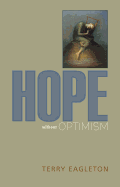
Terry Eagleton (Across the Pond) is a British literary scholar, theorist, intellectual and prolific author. In his opinion, the subject of hope has often been neglected by serious thinkers who viewed it as a delusion that "devaluates each moment, laying it on the sacrificial altar of a future fulfillment that will never arrive." In Hope Without Optimism, he attempts to fill this gap.
In the first chapter, Eagleton thoroughly dismisses optimism as a form of fatalism, a shallow, naïve and degenerate kind of hope that underestimates the seriousness of life's difficulties. " 'Always look on the bright side of life' has about as much rational force as 'always part your hair in the middle,' or 'always tip your hat obsequiously to an Irish wolfhound.' "
He inquires into exactly what authentic hope is. Despite his reference to the relative neglect of this topic, he considers a wealth of ideas by philosophers, theologians and literary figures, including Wittgenstein, Marx, Thomas Aquinas, Walter Benjamin, Ernest Bloch and Shakespeare. Hope is rooted in despair, he writes, and requires fallibility, humility and some rational "reasonable expectation" for the future, though that expectation may not be for oneself.
This is a scholarly book in many ways, and requires a clear and concentrated mind. However, Eagleton is not given to academic jargon and, like any good teacher, inserts regular doses of humor and skeptical asides. In conclusion, he underscores the necessity of hope for radical social and political change. "Hope can acknowledge loss or destruction to be unavoidable... yet still refuse to capitulate." --Sara Catterall

